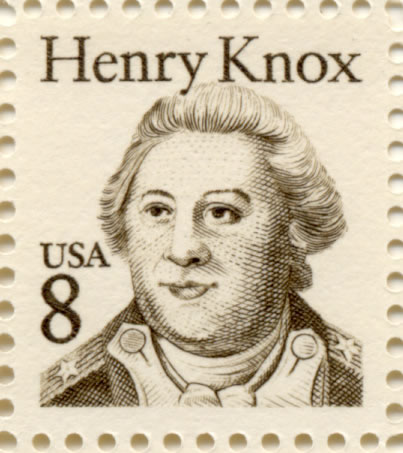Henry Knox |
 |
Henry Knox was born on July 25, 1750, in Boston, Massachusetts. Henry was the seventh of ten children born to parents William and Mary Knox from Northern Ireland. William Knox died at the age of 50, which left his son Henry to help support his family financially. Henry Knox enjoyed reading and in particular reading about military artillery and history. After his father’s death, Henry went to work in a local bookstore as a clerk to help support his mother. Later on, Knox opened a bookstore of his own in Boston, Massachusetts. Henry Knox’s passion for military history eventually lead him to join the local Boston artillery company and put his knowledge gained from reading into practical use. In 1772, Henry Knox joined the Boston Grenadier Corps where he gained more experience with military artillery. In 1775, Knox voluntarily fought at the Battle of Bunker Hill and served under General Ward. In 1775, Knox would also meet General George Washington. General Washington had taken over command of the Continental Army. Henry Knox and Washington soon became friends because of their shared interest and knowledge of military history and artillery. General Washington decided to make Henry Knox a colonel in command of the Continental Army’s artillery division. After being placed in command of the artillery, Colonel Knox was charged with moving approximately 50 cannons to Boston from then seized Fort Ticonderoga in what would come to be known as the noble train of artillery. Colonel Henry Knox was able to successfully move the captured cannons more than 300 miles through the Berkshire Mountains by ox sled to Boston in just over six weeks. The cannons, which were strategically placed on Dorchester Heights overlooking Boston, prompted British naval forces occupying Boston Harbor to evacuate. Knox’s amazing feat is commemorated as part of the Henry Knox Trail in New York and Massachusetts. Colonel Henry Knox continued to advise General Washington and command a military division of artillery throughout the Revolutionary War. Colonel Knox’s knowledge and expertise in military artillery helped General George Washington and America gain its independence from England. Henry Knox died at the age of 56 in 1806 in Thomaston, Maine. |